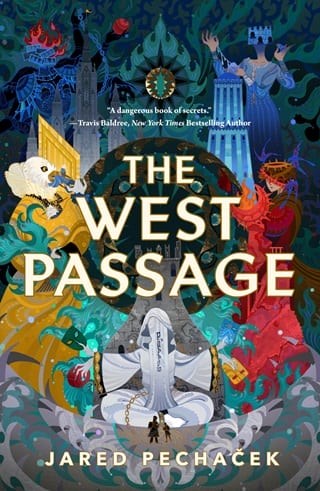7. Pell Learns a Bit and the Beast Rises
7. Pell Learns a Bit and the Beast Rises
The slabroom was as long as the refectory, and as high. Narrow windows lined two of its walls, which were of unadorned grey stone. Dark rafters crisscrossed the ceiling, which was white plaster, except where it was black mildew. The flagstones sloped a little toward the center, where a drain went who-knows-where. And all down the length of the room were three rows of granite slabs, each carved with simple channels to drain onto the floor.
When Pell finally arrived, hands dry and rough from washing, Yarrow was already there. She had donned an enormous dingy leather apron and stood near one of the slabs. There was a body on the smooth surface.
Pell's feet nearly drew her up short, but she mastered them and approached with stiff calm. Yarrow waited for her coolly. Who had died?
Nobody, it turned out. The body was of chipped and crackled porcelain. Its abdomen opened on brass hinges to reveal porcelain organs, their paint worn away. Some of them seemed to have been broken and glued back together, and the gallbladder was entirely gone, replaced with a little green sack of beans.
"You are here to learn the ways of the women in grey," said Yarrow. "You are the eldest of the girls, and it will soon be time for you to take on real duties."
"I am ready for a real body," said Pell stoutly. After all the anatomy lessons, after the diagrams in the Archives, what didn't she know?
Yarrow laughed sharply. "No you're not. You'll learn with this, as we all did. Besides, nobody's dead yet. And if they were, a corpse is terrible easy to mess. Say you're asked to see the hurt in a kidney, see why someone died of it, and when you're done you put everything back in wrong and it spills out on the way up-tower? Shame and disgrace on the house, it would be. So we start here, with something you cannot harm."
Pell's cheeks burned, but she swallowed her pride as Yarrow showed her the way everything nestled together, the close-packed strangeness of one's insides. When Pell had learned it to Yarrow's satisfaction, the woman began to tell her the rites for Ladies.
"But there are no Ladies anymore," said Pell, once Yarrow had made her repeat the rules thrice.
"Not in Grey," said Yarrow, stuffing an intestine back into the false corpse. "In Black, there are several: great Willow at the top, Lady of us all, and a dozen nattering upstarts at the bottom. In Blue there's the old one and her daughters; in Red the young one and her sisters; and in Yellow they say there's the ancient one. A true ancient one. Wouldn't want to go there. But it's no matter, as I won't, and anyway the Ladies haven't sent their own dead here for a long, long time."
"It's said everyone dead goes up-tower."
"Yes."
"But I've never seen any dead at all come in from the other towers."
"Yes."
"Does nobody else die?"
Yarrow shut the lid of the corpse and began to pour water from a jug over her hands. "Always wash before leaving the slabroom. Death wants to spread."
Pell washed. "Does nobody else die, Mother Yarrow?"
"Everyone dies except the Lady in Yellow, the songs and stories say. But not everyone keeps the customs of birth and death. By rights we should be the busiest tower, and there are a lot of stories about why we aren't." Yarrow dried her hands on a linen towel and passed it to Pell. "And no, I don't know which stories are true."
She took off her apron and hung it on a peg in the wall, next to several others that had rotted with time. "You'll be fitted for a woman's apron soon," said Yarrow. "And once you know everything about how people die in the palace, you'll learn about how people are born."
She stalked out of the slabroom, and Pell hurried after her. The crumbling halls echoed to her footsteps. Dust rose in her wake. The echoes faded. Dust fell from cold light into colder shadows. All was still.
Under the earth, where nothing had bothered it for a long time, something shifted. Let us, for the sake of knowing it better, pretend three things. First, that there is light beneath the earth for us to see it by. Second, that its motion occurs on a scale comprehensible to people. Third, that something outside nature can be described using words arising from nature.
The earth packed in all around it, for it was so large that there was, indeed, no other way for earth to behave in its presence. There were several limbs, but no obvious head. There were more than several eyes, which it kept damp with several tongues. Despite the tongues, it had no mouth. It was somewhat longer than it was tall, and all down its length were colors and slimes and smells. Any part of it could swivel in any direction, or suddenly move, so that an eye might open where no eye had been, or a limb spiral out where before there had been only smooth slime.
Occasionally it woke. More often it would sleep, dreaming such dreams as such beasts do: dreams of crunching, of gushing, of warm fluids down the gullet. If this beast measured time, it was not in heartbeats but in dreams. The rhythmic slosh of the subconscious was all the calendar it needed, and all the company it kept. But now and then it heard something from up above.
When it did wake, it was always hungry. What did it eat? Oh, all kinds of things: the ends of turnips, cartwheels, babies, sunlight, crumbs. Once it quite enjoyed a potato. If it could conceive of the palace as anything, it was as a buffet. It rarely conceived of the palace, because that gave it a headache—or would, if the Beast had possessed a head. The guardians of the West Passage had often tried to derive some comfort from the knowledge that they were as terrifying and inconceivable to the Beast as it was to them, but that never helped.
Part of its inconceivability was that it could only take one approach to the palace: the West Passage itself. That had been its road time out of mind, and it knew no other way. Indeed, it could not come close to knowing that another way might exist, just as your lungs know no other thing to breathe but air. Just then, the Beast found itself thinking (if it thought) of food, and its limbs and body and eyes and tongues began to uncoil, as slowly as continents drifting, and it aimed its will (if it had a will) toward the surface and the start of the West Passage.
Meanwhile, Pell learned. Winter did not lift. She and the women in grey and the girls in grey did not know it, but this was an infallible sign of the Beast's approach. The rats had been another. The guardian knew, but the guardian was dead, and the apprentice gone who knows where, and so the Beast moved inch by inch through rock and soil, unnoticed by anything except vermin.
 Fullepub
Fullepub 



